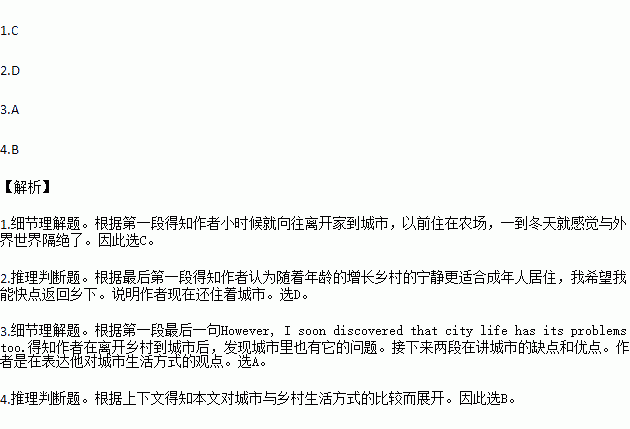题目内容
When I was a child, I often dreamed of the time when I could leave home and escape to the city. We lived on a farm and, in the winter especially, we were quite cut off from the outside world. As soon as I left school, I packed my bags and moved to the capital. However, I soon discovered that city life has its problems too.
One big disadvantage is money---it costs so much to go out, not to mention basics like food and housing. Another disadvantage is pollution. I suffer from asthma(哮喘), and at times the air is so bad that I am afraid to go outside. Then there is the problem of travelling round. Although I have a car, I seldom use it because of the traffic jams. One choice is to go by bicycle, but that can be quite dangerous.
Of course there are advantages. First, there is so much to do in the city, whatever your tastes in culture or entertainment. Besides, there are wonderful jobs and greater chances of moving to a more important job or position. Finally, if you like shopping, the variety of goods is very surprising---and, what is more, shops are often only a short walk away.
Is life better then, in the city? Perhaps it is, when you are in your teens(十几岁) or twenties. However, as you get older, and especially if you have small children, the peace of the countryside may seem preferable. I certainly hope to move back there soon.
1.What was the writer always thinking about when he was a child?
A. Staying on the farm
B. Moving to the countryside
C. Leaving home for the city
D. Running away from the school
2.Which of the following is true about the writer?
A. He is very old now.
B. He is in good health.
C. He prefers driving a car.
D. He lives in the city now.
3.In the passage, the writer tries to _______.
A. express his opinions about way of life
B. describe his life in the countryside
C. show an interest in the outside world
D. persuade the reader to live in the city
4.How is the passage mainly developed?
A. By inferring
B. By comparing
C. By listing examples
D. By giving explanations

